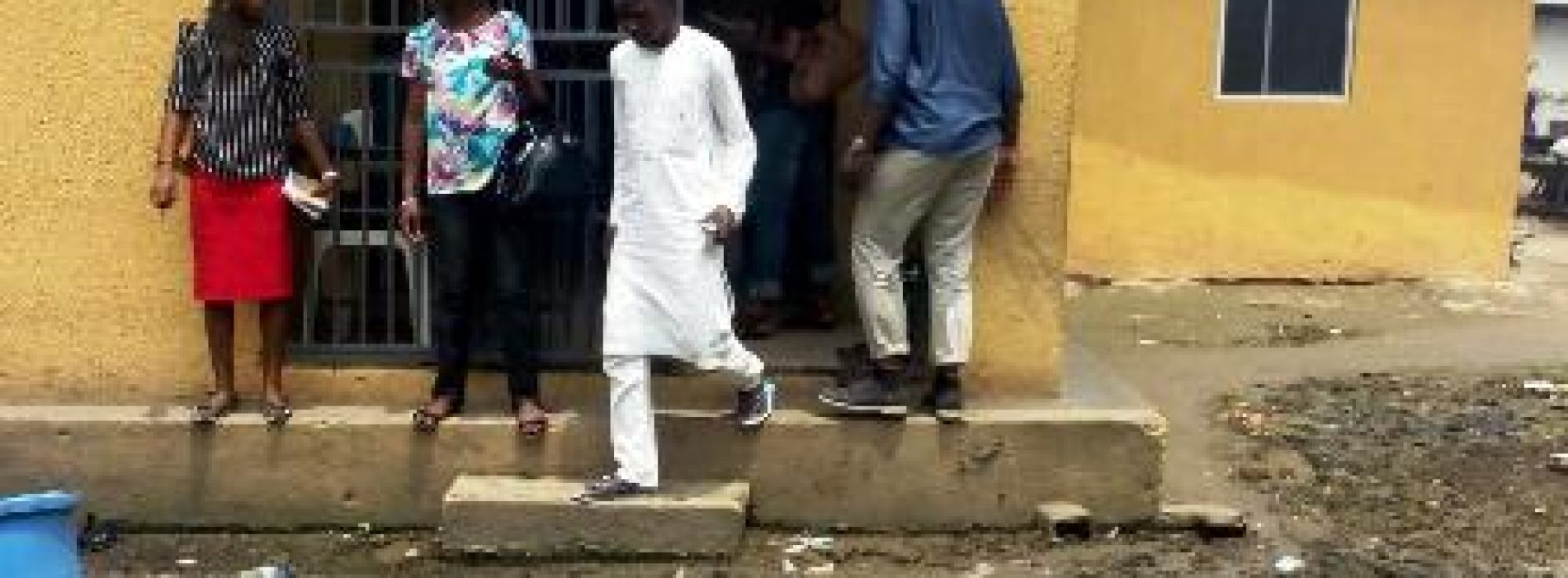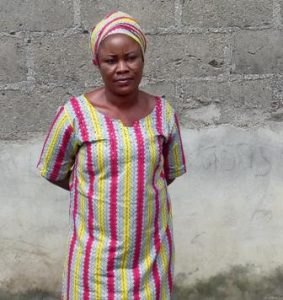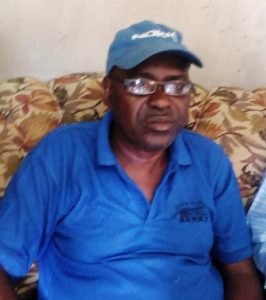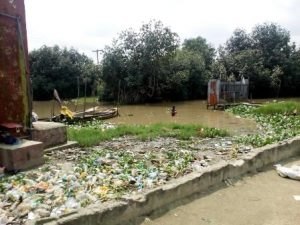Agboyi Ketu: Where TBAs hold all aces as midwives
For the people of Agboyi Ketu, a Lagos suburb, lack of basic amenities and depth of traditional beliefs, strengthen the people’s confidence in Traditional Birth Attendants. NHO correspondent, JULIET UMEH visited the community and interacted with the people. Her report:
A visit to Agboyi Ketu – a rural community of an estimated 50,000 population on the northeastern plane of the city of Lagos, in Lagos State, Nigeria, is an eye opener. Situated along the coastal area of Ogun River tributaries and largely surviving on fishing and trading on sea foods, Agboyi Community lacks essential basic social amenities, particularly roads, potable water, secondary schools, and healthcare facilities.
There is no bridge linking the Community with other communities and residents only move around in canoes. If indeed health is wealth, the poor people of Agboyi Ketu can be said to be unhealthy or medically challenged based on findings in the area. They proactively rely on alternative healthcare system in the form of traditional medicine.
The shortcomings of this method are felt more by vulnerable groups, particularly the expectant mothers and their unborn children, thus it is no surprise that maternal and child mortality issues have been a permanent challenge in the community for a long time.
Becoming pregnant is not a problem in Agboyi Ketu, on the contrary, pregnancy is one of the commonest features of livelihood of the inhabitants of this sleepy little town. Many adolescents and young women at various stages of pregnancy populate the community; however, the big challenge of pregnant women in Agboyi is having access to giving birth in a standard health facility where qualified health providers are in attendance.
A recent visit by Nigeria Health Online to the community provided extensive insight into the travails of the residents. Within the vicinity is a Primary Healthcare Centre (PHC) that operates eight
hours daily with just three staff though emergencies or pregnant women who fall into labour after the PHC closes at 5.00 PM are practically on their own. This centre is however grossly underutilized. Traditional Birth Attendants (TBAs), who lack expertise to cope with complications during childbirth, hold sway here.
Lack of modern health facilities has, over the years, opened door of opportunity for TBAs like Agoro Nurat who has been in practice in the community for 25 years. She has never lacked patronage in all her years of practice.
All a first timer needs to do, she explains, is to pay a “small amount” of N2000 for herbal preparations and some concoctions which she will take for three months. Subsequently, the woman pays N200 each clinic day which is on Mondays and then, after delivery they pay N5000.
“Presently, I have over 200 women who have registered with me since 2016. I have a certificate from the Board of Traditional Medicines and other training with my license which I renew every year,” she told NHO.
A mother, 33 years old Shakirat Yakubu, said she had all her children through TBAs. Shakirat who was about eight month old pregnant when encountered by NHO, said she had no intention of patronizing any hospital to give birth. She said she only goes to the PHC for injections.
“I had my three children at TBA home and God has been helping me, I’ve never had problem. I go to the TBA every Monday for routine check, my agbo and other medicines. I only visit the health centre to take injection. If I have complaints the TBA would give me medicine. She would always put something on my hand and check how my baby is doing. If necessary, she would tell me what to do or use.
For Kukoyi Islamiat, who is pregnant with her second baby, the TBA home remains the ideal place for a woman to receive care for pregnancy and delivery. She had her first baby here and is all set for a “safe” second delivery.
“This place is good; it was here I had my first baby; that’s why I came back. Some people go to the hospital but I prefer coming here my sister also had her baby here. Even if I have the money, I won’t go to the hospital because I am being well treated here, so I don’t need hospital,” she said confidently adding that she only goes to the hospital for injections.
Temitope Olariwola, 29, another resident of Agboyi Ketu, also patronises TBAs. Although registered with a faith-based organization in Agbado Ijaye, she could be described as a ‘TBA faithful’.
“I registered here with N3, 000 and if I am coming for antenatal I bring N200 every week. In the antenatal, they give us medicine and agbo. We only go to the clinic for injections,”
Olariwola said.
Prince Timothy Bankole, who is of Agboyi Ketu traditional ruler’s lineage, also recounts his experience:
“Maternal issue has been a long time problem here. I remember, my last baby, who is now 27 years old was born in the night. We had a tough time before we could ferry my wife through to the other side,”
According to Bankole, the community has lost many women during childbirth which also contributes to the maternal health burden for Lagos State, which according to Special Adviser to the Lagos State Governor on Primary Health Care, Dr. Olufemi Onanuga, is still 555 per 100, 000 live births.
“We have lost a lot of women as well as unborn children in the past. But the mortality has reduced due to the effort of non-governmental organisations (NGOs) and we still want them to do more. We want government to come in; not until we have 24 hours operation here, whatever happens in the night is in the Almighty’s hand,” he said.
Bankole, whose traditional title is Asoju-Oba of Agboyi Kingdom, explained how residents of the community cope without viable healthcare facilities. According to him, the PHC in the area has not been well equipped like those in other Local Government and Local Council Development Areas of Lagos State.
“The maternity aspect of our PHC isn’t like others. The 24-hour maternity is not there. It’s just some NGOs that are helping us to build some infrastructures. It has been an age-long problem for issue of maternity for our women particularly when they are about to put to bed it is always a problem,” he stressed.
A staff of the PHC, who pleaded anonymity because she was not authorized to speak, expressed concerns about the low patronage of the health centre.
“They (women) don’t patronize the health facility because they are so much attachment to the TBAs,” she told NHO.
According to her, the few women that visit the PHC only do so to receive injections after which they return to the TBAs for antenatal and delivery. All efforts to change the women’s perception and attitude towards TBAs have proved abortive as they prefer TBAs and Faith Based Organizations, particularly churches.
The PHC staff also revealed that some notable misdemeanors rampant in the community include teenage pregnancy and smoking of hard drugs, which informed why she goes about with condoms, sharing it to some of the boys who, she feels, are responsible for the rampant teenage pregnancy in the community.
Experts however agree that the risk of stillbirth or death due to intrapartum-related complication can be reduced by about 20 percent with the presence of a skilled birth attendant. Reflecting its importance in reducing maternal morbidity and mortality, skilled birth attendance was included as indicator 3. 1. 2 under Goal 3 and Target 3. 1 of the Sustainable Development Goals.
The challenges in Agboyi community are however multi-faceted. The people care less about their environment. They defecate in surrounding rivers, bathe, swim and wash with the same water. The whole area stinks, including the surroundings of the PHC which is littered with dirt.
Obviously, Agboyi Ketu indigenes still need reorientation; their belief in TBA has eaten deep into them. They see it is a way of life, a belief fully backed by the elders and leaders of the community.
Indeed, the Alliance Chairman for World Health Committee in the community, Elder Olusegun Makun, while speaking with journalists, expressed confidence in the TBAs saying government has given them the required training.
Presently, the residents of Agboyi Ketu are in need of succor from archaic health behaviour and management. Though the community is in dire need of social amenities, the people desperately need
reorientation towards embracing orthodox medicine, its efficacy and the limit of traditional medical practice, which they have been used to for ages.












0 Comments
No Comments Yet!
You can be first to comment this post!